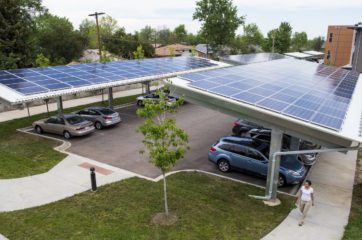A bipartisan group of Congressmen filed an ambitious carbon pricing bill this week during the traditionally slow lame duck period in Congress. Although unlikely to pass by end of session, the bill is a step in the right direction for national climate action and positions carbon pricing advocates to take advantage of momentum building in across the country.
The Federal Carbon Pricing Bill
The ‘Energy Innovation and Carbon Dividend Act of 2018’ (H.R. 7173) was introduced in the US House of Representatives late Tuesday afternoon by a bipartisan group of 5 Congressmen, 2 Republicans and 3 Democrats. All are members of the Climate Solutions Caucus, which has advocated for bipartisan solutions to climate change since its founding in 2016.
According to bill sponsor Rep. Ted Deutch (D-Florida), the bill will reduce emissions nationally by 33% in 10 years, and a total of 90% by 2050 (vs. 2015). It will also create over 2 million jobs in the coming decade, and prevent upwards of 13,000 pollution related deaths annually.
There are 4 main parts of the bill:
Carbon Fee: The bill starts off by putting a low fee of $15/ton on coal, oil, and gas starting in 2019. This fee would rapidly increase by $10/ton each year until the country hits new emissions targets are met. With targets set at a 91% reduction by 2050 (based on 2015 numbers), the total carbon fee could reach as high as $100/ton by 2030.
Carbon Dividend: As written, the bill does not allow the government to keep revenue generated from this carbon fee. Money collected from the fee is given back equally to all Americans in monthly cash transfers. The low costs of administering the entire program would come out of the fee collected.
Border Carbon Adjustment: The bill addresses concern of manufacturers by adjusting the price of imported goods to reflect their cost with a carbon fee. At the same time, the bill would give all exported goods a refund. This is meant to keep domestically manufactured US goods competitive nationally and globally, and ensure the carbon price does not violate existing world trade policies.
Regulatory Adjustment: The bill puts a stop on all added EPA regulations of GHG emissions, as long as the emissions reduction targets in the bill are met. If they are not met after a decade, the bill restores these previously existing regulations. This section does not impact EPA regulations over water quality, auto mileage standards (i.e. CAFE standards), and other pollutants like methane and mercury.
The Carbon Pricing Bill in Context
Although unlikely to pass anytime soon, the bill is a welcoming sign for climate advocates for a number of reasons.
First, it sets up congress to take advantage of the growing carbon pricing momentum coming out of states. Advocates now have a specific bill they can refer to, and supporters in congress will have more time to introduce carbon pricing to peers. This comes as multiple state legislators are introducing their own carbon pricing bills. Among them are Massachusetts, Utah, New York, Pennsylvania, Connecticut, Maryland, New Jersey, Rhode Island and Vermont.
As the policy gains traction in the states, which will become the testing grounds for carbon pricing as a policy, the federal government will become increasingly likely to take it up. This tried and true tactic has lead to success with a number of previous policies, such as healthcare and increasingly marijuana legalization.
Second, it’s a step in the right direction for a congress plagued by partisanship, and shows the willingness of at least some Republicans to address the threat of global climate change. The bill is the first major legislative products of the Climate Solutions Caucus, which although faced challenges during the midterms is still able to bring a sizable number of Republican congresspeople to the table.
The bill also highlights how climate change is becoming a ‘bridge issue,’ where members of both parties can find consensus, as opposed to a wedge issue that divides Democrats and Republicans. We are seeing a shift in congress away from debating the existence of climate change, and towards debating solutions to it. In the coming session expect the discussion to center around policy solutions, like whether we should adopt a ‘Green New Deal’ as opposed to a carbon pricing approach.
Next Steps
With Republicans still in control of the House until the end of the session in January, don’t expect a vote on the bill anytime soon. It will be interesting to see whether the bill is re-filed in the spring, when the House reconvenes under Democratic control.
In the meantime, states are set to advance carbon pricing in their own legislatures regardless of whether congress acts this session or not.
Get involved with the local campaign to pass carbon pricing in your state









